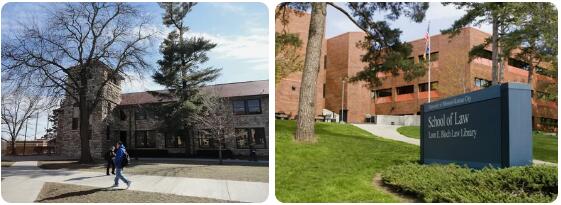The University of Kansas School of Law was founded in 1893 and opened its doors in 1895. It was the first law school established in the state of Kansas and has since become one of the top-ranked public law schools in the nation. Over the years, the school has developed an impressive roster of alumni who have gone on to become influential figures in their respective fields. In addition to its strong academic reputation, the School of Law is known for its commitment to diversity, inclusion, and social justice. The school has a long history of working with underserved populations and creating opportunities for students from all walks of life. In 2004, it became one of only 15 law schools to receive a prestigious grant from the Carnegie Foundation for Teaching Excellence which allowed it to expand its clinical offerings and provide more students with hands-on experience. This grant also enabled the school to create new programs such as its Center on Race & Ethnicity in American Law which provides research opportunities and support services for minority students interested in pursuing a legal career. The School of Law also boasts an impressive faculty that includes scholars from across disciplines as well as nationally recognized experts in their respective fields. With its strong academics, commitment to social justice, and expansive faculty, it’s no wonder that University of Kansas School of Law is considered one of the best public law schools in the country.
University of Kansas School of Law is located in the state of Kansas. As one of the leading law programs, University of Kansas School of Law has a high average LSAT score of 155-160 when recruiting new students. As a return, the median starting salary for law graduates reaches $62,500 per year. See the following table for detailed admissions information and career profiles of University of Kansas School of Law.
Admissions: University of Kansas
The University of Kansas School of Law is one of the top law schools in the nation. It has a highly selective admissions process, with an acceptance rate of just over 24%. The average LSAT score for incoming students is 164, and the median GPA is 3.73. The school also looks at other factors when considering applications, such as extracurricular activities, letters of recommendation, and personal statements. In addition to these admissions criteria, the school also considers applicants’ diversity backgrounds and life experiences in their evaluations. The University of Kansas School of Law also has a robust financial aid program that offers generous scholarships and grants to many students. In addition to these awards, the school also offers loans and work-study programs to help students pay for their education.
| Fall 2019 Admissions and Enrollment Statistics | |
|---|---|
| Total number of full- and part-time applicants | 1,098 |
| Total number of full- and part-time acceptances | 387 |
| Overall acceptance rate | 35.2% |
| Total number of full- and part-time first-year students enrolled | 163 |
| Number of full-time program applicants | 1,098 |
| Number of full-time program acceptances | 387 |
| Full-time acceptance rate | 35.2% |
| Number of first-year full-time students enrolled | 163 |
| Number of part-time program applicants | N/A |
| Number of part-time program acceptances | N/A |
| Part-time acceptance rate | N/A |
| Number of first-year part-time students enrolled | N/A |
| Fall 2019 GPA and LSAT Scores | |
| 25th-75th percentile GPA scores for all students | 3.25-3.71 |
| 25th-75th percentile LSAT scores for all students | 155-160 |
| 25th-75th percentile undergraduate GPA for full-time students | 3.25-3.71 |
| 25th-75th percentile LSAT scores for full-time students | 155-160 |
| 25th-75th percentile undergraduate GPA for part-time students | N/A |
| 25th-75th percentile LSAT scores for part-time students | N/A |
Careers: University of Kansas
| Bar Statistics (Winter and Summer 2018 administrations) | |
|---|---|
| State where the greatest number of first-time test takers took the bar | KS |
| School’s bar passage rate for first-time test takers | 94.2% |
| Statewide bar passage rate for first-time test takers | 89.3% |
| Class of 2018 Graduates | |
| Total graduates | 164 |
| Graduates employed at graduation | 69.4% |
| Graduates known to be employed nine months after graduation | 93.6% |
| Starting Salaries of 2018 Graduates Employed Full-time | |
| 25th percentile private sector starting salary | $50,000 |
| Median private sector starting salary | $62,500 |
| 75th percentile private sector starting salary | $105,000 |
| Percent in the private sector who reported salary information | 71% |
| Median public service starting salary | $46,000 |
| Areas of Legal Practice (Class of 2018) | |
| Percent employed in academia | 0.8% |
| Percent employed in business and industry | 14.6% |
| Percent employed in government | 17.5% |
| Percent employed in all judicial clerkships | 7.3% |
| Percent employed in law firms | 56.2% |
| Percent employed in public interest | 3.6% |
| Percent employed in an unknown field | 0.0% |
| Percent employed in a judicial clerkship by an Article III federal judge | 2.9% |
| 2018 Graduates Employment Location | |
| Graduates employed in-state | 44% |
| Graduates employed in foreign countries | 2% |
| Number of states where graduates are employed | 21 |
| New England (CT, ME, MA, NH, RI, VT) | 1.5% |
| Middle Atlantic (NY, NJ, PA) | 2.2% |
| East North Central (IL, IN, MI, OH, WI) | 2.2% |
| West North Central (IA, KS, MN, MO, NE, ND, SD) | 67.9% |
| South Atlantic (DE, DC, FL, GA, MD, NC, SC, VA, WV) | 5.1% |
| East South Central (AL, KY, MS, TN) | 0.0% |
| West South Central (AR, LA, OK, TX) | 5.1% |
| Pacific (AK, CA, HI, OR, WA) | 4.4% |
| Mountain (AZ, CO, ID, MT, NV, NM, UT, WY) | 8.7% |
| Employment location unknown | 0.7% |
| Career Services | |
| (Data appear as originally submitted by this school) | |
| Career services operations | The Office of Career Services is committed to helping all students, regardless of career aspirations or credentials, to realize their employment goals. Annually over 100 employers interview on campus. The Office also offers counseling sessions, resume and interviewing workshops, a 1L Mentor Program, and a speaker series featuring a diverse group of panelists from all areas of the law. |
| Job Type | |
| Bar admission required or anticipated (e.g., attorney and corporate counsel positions, law clerks, judicial clerks) | 88.0% |
| J.D. preferred, law degree enhances position (e.g., corporate contracts administrator, alternative dispute resolution specialist, government regulatory analyst, FBI special agent) | 8.0% |
| Professional/other (jobs that require professional skills or training but for which a J.D. is neither preferred nor particularly applicable; e.g., accountant, teacher, business manager, nurse) | 4.0% |
| Nonprofessional/other (job that does not require any professional skills or training or is taken on a temporary basis and not viewed as part of a career path) | 1.0% |









